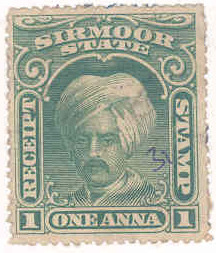Top Qs
Timeline
Chat
Perspective
Sirmur State
Princely state of India From Wikipedia, the free encyclopedia
Remove ads
Sirmur (also spelled as Sirmor, Sirmaur, Sirmour, or Sirmoor) was a princely state of India, located in the region that is now the Sirmaur district of Himachal Pradesh. The state was also known as Nahan, after its main city, Nahan. The state ranked predominant amongst the Punjab Hill States. It had an area of 4,039 km2 and a revenue of 300,000 rupees in 1891.[citation needed]
This article needs additional citations for verification. (June 2025) |



Remove ads
History
Summarize
Perspective
Origin
According to Mian Goverdhan Singh in Wooden Temples of Himachal Pradesh, the principality of Sirmaur was founded in the 7th to 8th century by Maharaja of Parmar Rajputs, and Rathore noble.[1]
Nahan State
Nahan, the predecessor state of Sirmur, was founded by Soba Rawal in 1095 AD who assumed the name Raja Subans Prakash.[citation needed]
Near the end of the 12th century in the year 1195, a flood of the Giri River destroyed the old capital of Sirmaur-Tal, which killed Raja Ugar Chand.[1] A ruler of Jaisalmer, Raja Salivahana, thought this was an opportune time to attack the state as it was in a state of disarray due to the natural disaster and death of its ruler, so he sent his son Sobha to conquer the state.[1] The attack was successful and a new dynasty headed by Bhati Rajputs was established.[1] Sirmur was invaded by invader Jasrath's army, who also invaded fragments of Punjab and Jammu.[2]
Sirmur State
Eventually in 1621 Karm Parkash founded Nahan, the modern capital.[3] Budh Parkãsh, the next ruler, recovered Pinjaur for Aurangzeb’s foster-brother.[citation needed] Raja Mit Parkãsh gave an asylum to the Sikh Guru, Gobind Singh, permitting him to fortify Paonta in the Kiarda Dun; and it was at Bhangani in the Dun that the Guru defeated the Rajäs of Kahlur and Garhwäl in 1688.[3] But in 1710 Kirat Parkãsh, after defeating the Räja of Garhwal, captured Naraingarh, Morni, Pinjaur, and other territories from the Sikhs, and concluded an alliance with Amar Singh, Raja of Patiala, whom he aided in suppressing his rebellious Wazir; and he also fought in alliance with the Raja of Kahlür when Ghuläm Kãdir Khan, Rohilla, invaded that State.[4]

Remove ads
Rulers
Summarize
Perspective
The rulers of Sirmur bore the title "Maharaja" from 1911 onward [citation needed]
Remove ads
Demographics
Remove ads
Artwork

Not many paintings depicting the historical rajas of Sirmur State have survived due to the Gurkha occupation of the state between 1803 and 1814, which led to the loss and destruction of much artwork, including any portraits of earlier rulers produced in Sirmur itself.[14][15]
Remove ads
Notes
- 1931-1941: Including Ad-Dharmis
References
Further reading
Wikiwand - on
Seamless Wikipedia browsing. On steroids.
Remove ads










